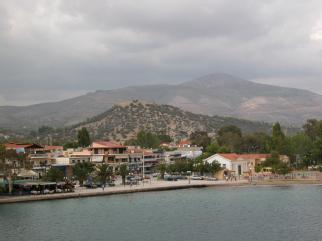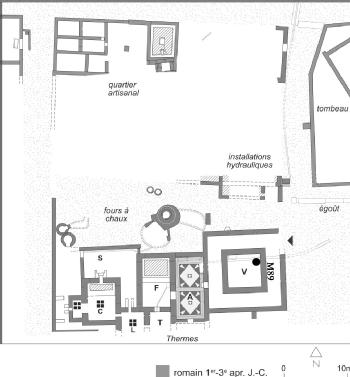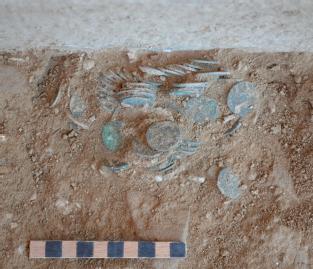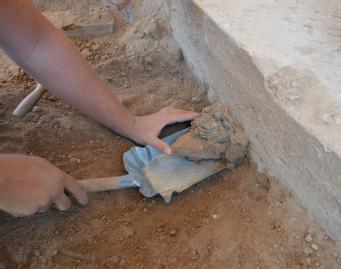All 1 entries tagged Coin Hoards
No other Warwick Blogs use the tag Coin Hoards on entries | View entries tagged Coin Hoards at Technorati | There are no images tagged Coin Hoards on this blog
September 01, 2013
A hoard of 201 antoniniani found in Eretria (Greece)
 |
| View of modern Eretria and its ancient acropolis |
In 2011, a hoard of 201 antoniniani minted between AD 219 and 254 was found in Eretria on the island of Euboea during the excavations of the Swiss School of Archaeology in Greece (ESAG). So far, this is one of the biggest hoards of this time found in Greece, which makes it all the more interesting.
The hoard was found in the Roman bath building, buried next to a wall forming the impluvium in a peristyle courtyard giving access to the proper bath rooms.
Most of the coins belong to issues of the reign of Gordian III (238-244: 80 coins), Philip I (244-249: 86 coins) and Trajan Decius (249-251: 30 coins), with only a few minted under Elagabalus (218-222: 2 coins), Trebonianus Gallus (215-253: 2 coins) and Gallienus (253-268: 1 coin).
This kind of coin distribution appears to be characteristic of a number of hoards from Greece, Turkey or the Balkans ending under the joint reign of Valerian and Gallienus (253-260): Greece 1980 (254), Caesarea (255-256), Iasos (257-258) and Pergamum (258-259). Some hoards of this period like Göktepe (253) or Singidunum (254) still contain denarii, but none was recorded in the Eretria hoard, which explains why the proportion of coins minted before 238 remains insignificant.
 |
|
Plan of the Roman bath of Eretria. The hoard was found against wall M 89 (© ESAG) |
While there are fewer coins of Trajan Decius (249-251) than his predecessors in quite a few of the hoards mentioned here, including the one from Eretria, it is possible to show that this is due to the shortness of his reign rather than to a reduction in the rate of hoarding. However, the rate of hoarding definitely slows down under Trebonianus Gallus (251-253) which seems surprising for hoards ending towards the end of Valerian and Gallienus' joint reign.
A study of the silver hoards buried in Greece during the 3rd century AD reveals that the coins in circulation in that region were replaced by new issues on a much faster basis than at the northwestern peripheries of the Empire (e.g. Britain).
The Eretria hoard appears to be typical of hoards ending between 251 and 264 that contain mainly issues minted between 238 and 251 (Mytilene, Cnossus, Greece 1980, Patras 1976, and Patras 1982). However, these issues seem to have almost completely disappeared from hoards buried after 265, towards the end of Gallienus' sole reign, when the antoniniani started to become heavily debased (Corinth 1930, Orchomenos, Chaeronea, Attica, Salamis, Athens 1955, Athens 1956, and Corinth 1936).
As most of the Greek hoards mentioned here are small in size (under 100 coins), they seem to reflect the daily coin circulation, which saw the disappearance of older, better coins from daily use.
So far, the Eretria hoard is the only one in Greece to show a small percentage of antoniniani minted in Antioch under Gordian III. As a general rule, the mint of Rome remains the only noteworthy supplier of coins in Greece up to Trebonianus Gallus. This changes under Valerian and Gallienus, when the coin supply from oriental mints increased suddenly to levels well above 50 %. The proportion of the Balkan mints however remained small at all times.
 |
 |
| Hoard in situ (© ESAG) | Hoard being removed during excavation (© ESAG) |
 Dr Marguerite Spoerri Butcher is Associate Fellow of the University of Warwick and she works for the Swiss School of Archaeology in Greece.
Dr Marguerite Spoerri Butcher is Associate Fellow of the University of Warwick and she works for the Swiss School of Archaeology in Greece.
She has published, jointly with A. Casoli, a complete study of the Eretria hoard: «Un trésor d’antoniniens trouvé à Erétrie en 2011 questions de circulation monétaire en Grèce au milieu du IIIe siècle», Revue Suisse de Numismatique 91, 2012, p. 111-206, which can be downloaded here .
.
 Clare Rowan
Clare Rowan

 Please wait - comments are loading
Please wait - comments are loading

 Loading…
Loading…

